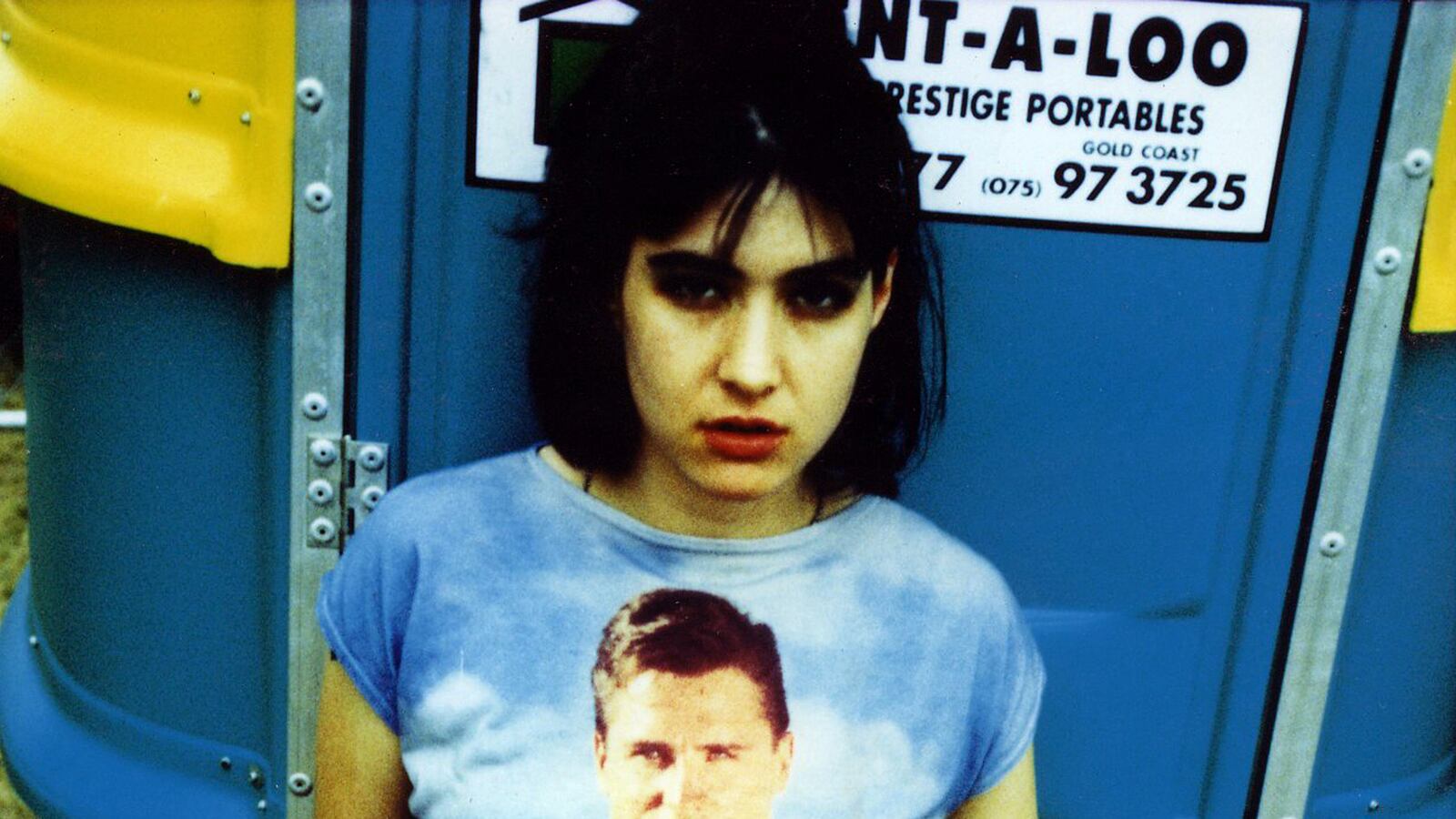The Punk Singer, a powerful documentary out on DVD this week, chronicles singer Kathleen Hanna’s revolutionary struggles—one cultural and one personal—and how they intertwine.

Directed by Sini Anderson, the film follows both the iconic “revolution girl sound” as it became known, that Kathleen Hanna and a group of committed feminists started in Olympia, Washington in the late ‘80s and early ‘90s, as well as the singer’s brush with illness and recovery.
The documentary effectively makes the case for Hanna as an activist who changed the role of women in music and culture by being "sexy and tough and angry and funny and all of those at once” in a way that female rock singers had not been before.
Watching grainy black and white footage of Hanna on stage fronting her band Bikini Kill, stripped to her underwear, "hopping up and down, SLUT" written on her stomach, ordering the boys to move away from the stage and instructing the girls "to the front," singing at the top of her lungs about abuse and sexual violence and female friendships is to witness a revolution in the making.
She created a safe space for women; physically at her shows, culturally through xeroxed fanzines, one on one as her peers shared traumas with her after concerts.
Watching her younger self today on the screen, Hanna, 45, tells The Daily Beast, "I never understood what the big deal was about our band. Then I watched the footage and I was like, "Oh, that's why people were freaking out about us."
In the film, which takes place between the late ‘80s to the present, the reaction to Hanna on stage is overwhelming. One fan refers to her as a "beam of light," and Hanna recalls that her younger self was very much in the maelstrom—receiving death threats from those who were threatened by her message, and adoration from those who found it empowering.
”The younger version of me didn't have thick skin about it at all," Hanna reflects. "I took everything in and I didn't have a strong enough sense of self to just tell myself, ‘You know what?This is just part of the job.’"
The struggle to "to take over the punk scene for women,” as depicted in the film, took its toll on Hanna, resulting in the breakup of her band in 1998 and her departure from the North West.
Not only did she change her demographics, but she moved away from the astringency of punk, too, and formed Le Tigre, a "feminist party band" that made melodic dance pop with a message. With songs like “TKO” and “Deceptacon" the band played to bigger and bigger audiences—until 2004 when Hanna began getting sick on tour.
Her symptoms became increasingly severe and eventually Hanna was diagnosed with Lyme Disease in 2010. Lengthy treatment and recovery followed, which kept Hanna from performing.
"Watching the footage [on The Punk Singer] while I was unable to perform live, was really difficult for me," Hanna says. "I was watching myself having a really great time on stage lying in bed unable to do anything. I used to have all of this energy. Look at me now. Will I ever be able to perform? That's all I could think of when I was watching it."
Her departure from music left her fans bereft: "Why has she forsaken us?" one asks in the film.
Eventually, Hanna recovered sufficiently to begin recording again. She formed The Julie Ruin and put out one of last year's best albums: Run Fast, a title suggesting that her years off stage left her with some ground to quickly make up.
The band's kickoff concert last year at tiny Union Pool in Williamsburg felt like both a celebration and a rebirth: Hanna's joy at just being on stage was palpable.
"Right now I'm doing great, and my doctor thinks I'm going to continue to do great," Hanna tells The Daily Beast. She now wakes up thankful for her recovery and is giving herself more freedom as a writer and performer as a result of her illness: "I'm not so focused on writing a certain way politically or making sure that I get this or that point across."
In fact, Hanna now celebrates younger artists who are walking in Bikini Kill’s footsteps, a world in which even Miley Cyrus can refer to herself as "one of the biggest feminists in the world."
"There are so many more bands today with women in them who are like 'I'm a feminist,'" Hanna says. "I never thought that would happen. There were only three bands like that in 1992."
While she says she hasn't read Sheryl Sandberg's Lean In, Hanna did follow the debate about it in the press. "I don't think she was saying that it's women's fault that they're not getting ahead in their jobs. I think she was saying that they suffer from internalized sexism and that it's the internalized sexism that sometimes makes us not demand what we're worth.
"It's an important message no matter what your job is, whether you're the President of Yahoo or you're a babysitter. I do think that particular message is something that a lot of people can relate to, not just corporate women. I'm not a corporate woman and I related to it.
"Anyway, I feel like women should be able to write whatever fucking book that they want to write," Hanna says emphatically.
To wit, Hanna is still writing her own proverbial book—the way she wants to write it. The Julie Ruin are touring this summer, and while her band’s name may have changed over the years, Hanna herself is still making that "revolution girl sound."






